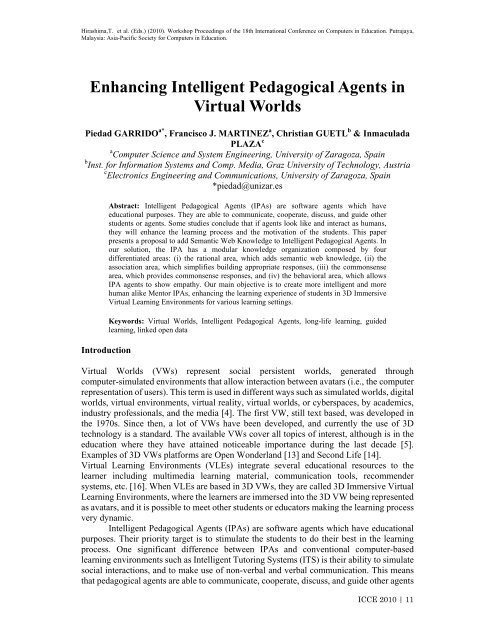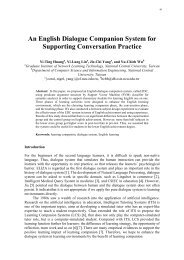ICCE2010 Workshop Proceedings - APSCE Asia-Pacific Society for ...
ICCE2010 Workshop Proceedings - APSCE Asia-Pacific Society for ...
ICCE2010 Workshop Proceedings - APSCE Asia-Pacific Society for ...
You also want an ePaper? Increase the reach of your titles
YUMPU automatically turns print PDFs into web optimized ePapers that Google loves.
Hirashima,T. et al. (Eds.) (2010). <strong>Workshop</strong> <strong>Proceedings</strong> of the 18th International Conference on Computers in Education. Putrajaya,<br />
Malaysia: <strong>Asia</strong>-<strong>Pacific</strong> <strong>Society</strong> <strong>for</strong> Computers in Education.<br />
Enhancing Intelligent Pedagogical Agents in<br />
Virtual Worlds<br />
Piedad GARRIDO a* , Francisco J. MARTINEZ a , Christian GUETL b & Inmaculada<br />
PLAZA c<br />
a Computer Science and System Engineering, University of Zaragoza, Spain<br />
b Inst. <strong>for</strong> In<strong>for</strong>mation Systems and Comp. Media, Graz University of Technology, Austria<br />
c Electronics Engineering and Communications, University of Zaragoza, Spain<br />
*piedad@unizar.es<br />
Introduction<br />
Abstract: Intelligent Pedagogical Agents (IPAs) are software agents which have<br />
educational purposes. They are able to communicate, cooperate, discuss, and guide other<br />
students or agents. Some studies conclude that if agents look like and interact as humans,<br />
they will enhance the learning process and the motivation of the students. This paper<br />
presents a proposal to add Semantic Web Knowledge to Intelligent Pedagogical Agents. In<br />
our solution, the IPA has a modular knowledge organization composed by four<br />
differentiated areas: (i) the rational area, which adds semantic web knowledge, (ii) the<br />
association area, which simplifies building appropriate responses, (iii) the commonsense<br />
area, which provides commonsense responses, and (iv) the behavioral area, which allows<br />
IPA agents to show empathy. Our main objective is to create more intelligent and more<br />
human alike Mentor IPAs, enhancing the learning experience of students in 3D Immersive<br />
Virtual Learning Environments <strong>for</strong> various learning settings.<br />
Keywords: Virtual Worlds, Intelligent Pedagogical Agents, long-life learning, guided<br />
learning, linked open data<br />
Virtual Worlds (VWs) represent social persistent worlds, generated through<br />
computer-simulated environments that allow interaction between avatars (i.e., the computer<br />
representation of users). This term is used in different ways such as simulated worlds, digital<br />
worlds, virtual environments, virtual reality, virtual worlds, or cyberspaces, by academics,<br />
industry professionals, and the media [4]. The first VW, still text based, was developed in<br />
the 1970s. Since then, a lot of VWs have been developed, and currently the use of 3D<br />
technology is a standard. The available VWs cover all topics of interest, although is in the<br />
education where they have attained noticeable importance during the last decade [5].<br />
Examples of 3D VWs plat<strong>for</strong>ms are Open Wonderland [13] and Second Life [14].<br />
Virtual Learning Environments (VLEs) integrate several educational resources to the<br />
learner including multimedia learning material, communication tools, recommender<br />
systems, etc. [16]. When VLEs are based in 3D VWs, they are called 3D Immersive Virtual<br />
Learning Environments, where the learners are immersed into the 3D VW being represented<br />
as avatars, and it is possible to meet other students or educators making the learning process<br />
very dynamic.<br />
Intelligent Pedagogical Agents (IPAs) are software agents which have educational<br />
purposes. Their priority target is to stimulate the students to do their best in the learning<br />
process. One significant difference between IPAs and conventional computer-based<br />
learning environments such as Intelligent Tutoring Systems (ITS) is their ability to simulate<br />
social interactions, and to make use of non-verbal and verbal communication. This means<br />
that pedagogical agents are able to communicate, cooperate, discuss, and guide other agents<br />
ICCE 2010 | 11



